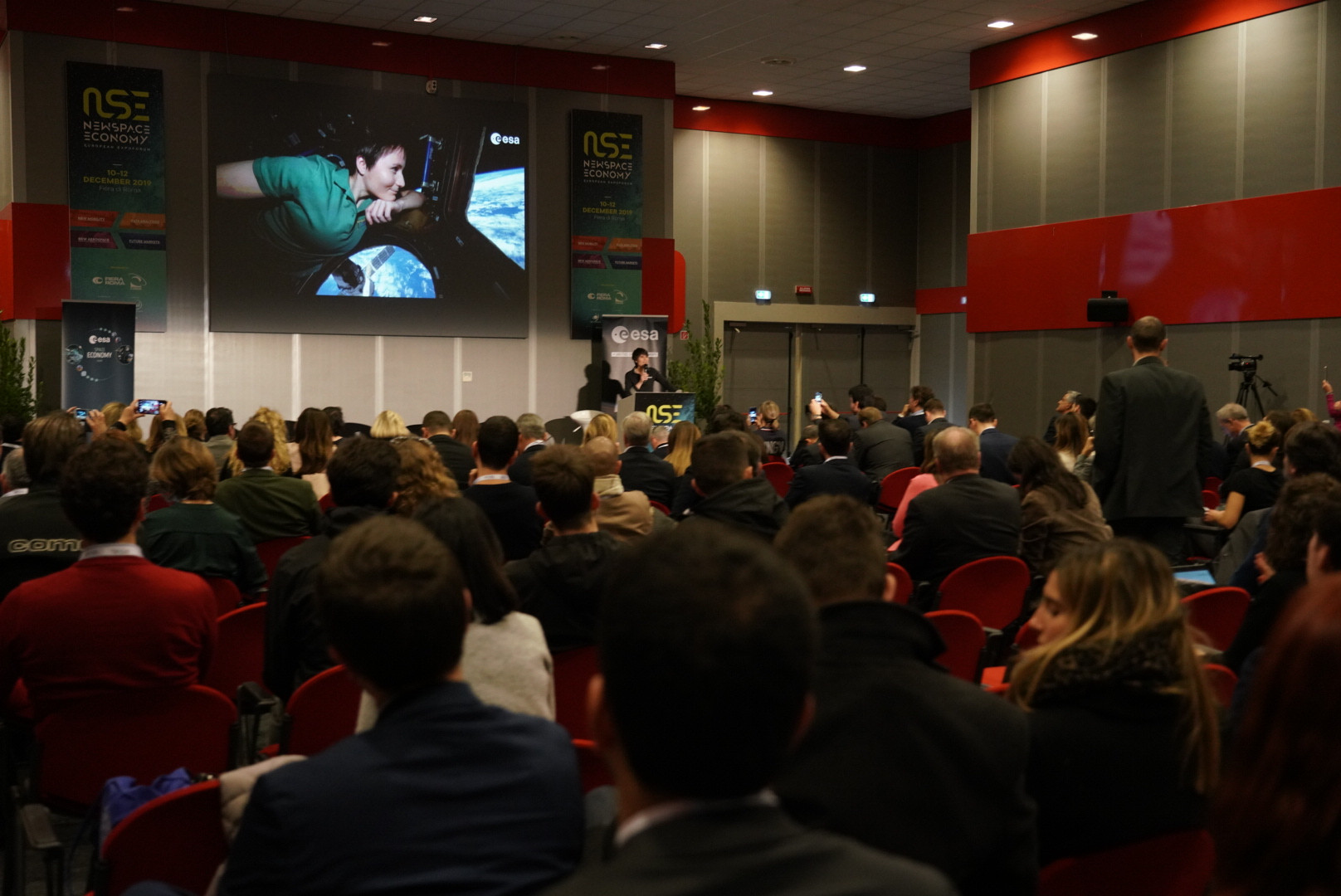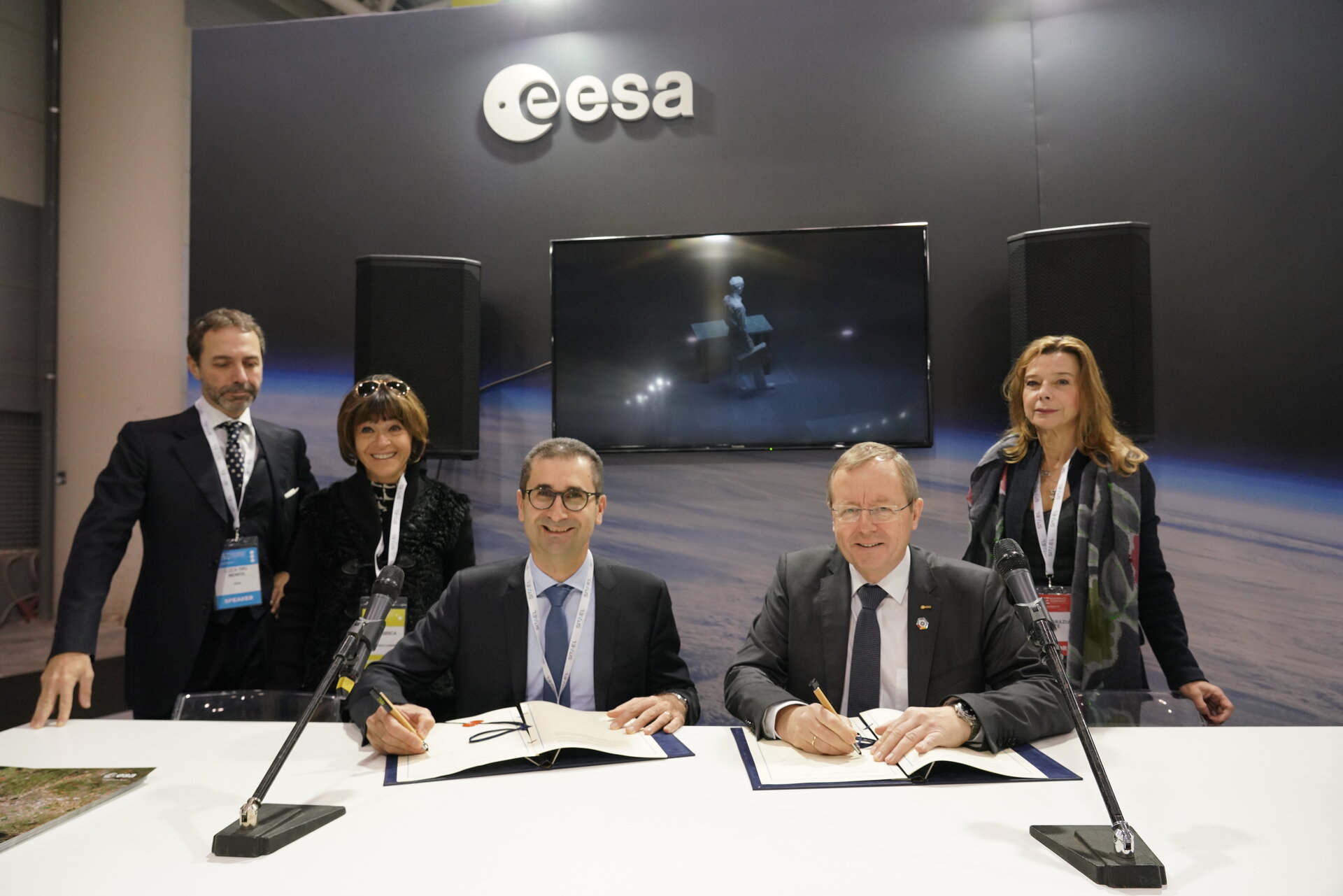
ESA at the New Space Economy European Expoforum • Dec 2019
From 10 to 12 December, ESA organised a special programme of
events at the New Space Economy European Expoforum (NSE) in Rome, Italy.
Organised in collaboration with Space Foundation, NSE Expo
Forum created an opportunity for existing and new industrial players, small and
medium innovative companies, investors, start-ups, research centres, space
agencies and institutions from the space sector and other sectors to meet and
exchange views among
During this event, ESA organised a series of events covering
a wide range of topics, including innovative space for smart cities,
cooperation with research and academia, access to investment for space
companies, and the worldwide competitiveness of the European space industry.
See the full agenda here.
DAY 1 – SPACE FOR EARTH
On 10 December, Jan Wӧrner, ESA Director General, inaugurated
the ESA booth and signed a Memorandum of Cooperation with Professor Francesco
Cupertino, Rector of Politecnico of Bari, setting up a new ESA_Lab focused on
Space Economy.
An ESA_Lab is an agreement between ESA and academia to promote
innovation in European space activities, to fully exploit the benefits of space-based
systems to the European society and to nurture a skilled workforce, ultimately
contributing to Europe’s overall knowledge base and competitiveness.

After the signature, ESA presented downstream projects in
the field of Smart Cities in the ESA booth.
”Downstream” activities refer to those activities based on space technologies
that result in an application= or service to the benefit of the European
economy or society.
Across the world, cities are struggling to provide critical
infrastructure and urban services to support their fast growing, often
unrelenting, growth. The city of the future can be smart, green and connected.
Behind many of the solutions necessary for developing Smart Cities and
sustainable urbanisation, there are space technologies which are fundamental
technological enablers such as using sensors and satellite connectivity,
navigation systems, and Earth observation data.
European companies presented their projects in four different fields : new
mobility, 5G, urban environment and cybersecurity.
ESA created an opportunity for the participants from
industry, municipalities, academia and institutions to meet and discover ESA projects supporting Smart Cities.

DAY 2 – GLOBAL SPACE ECONOMIC FORUM
On 11 December ESA’s Space Economy Team organised the second
Global Space Economic Forum (GSEF).
GSEF is the foremost creative platform to interactively discuss space-led innovation opportunities and the challenges arising from the on-going transformations driven by the space economy and the current and future trends in the global market.

More than 150 attendees from industry, institutions and academia joined this annual meeting to exchange ideas on global challenges and present innovative projects developed with ESA in areas such as cybersecurity, autonomous driving, urban innovation and artificial intelligence.
The theme chosen for the GSEF 2019 was “Space creates value” as space programmes continue attracting public investments, as demonstrated at Space19+,and on top, increasingly more private investments. These investments generate industrial activities that now play a daily part of citizen’s lives, in the domains of telecommunications, positioning, navigation and timing and Earth observation. Markets for applications and services have been created and currently generate significant commercial value.
Eric Morel de Westgaver, Director of Industry, Procurement and Legal Services, welcomed the attendees of the Forum and highlighted the importance of this annual event where ESA and the space sector have the possibility to develop collaborations with industry and institutions from other sectors.

Among other panels and speakers, Gian Paolo Manzella, the Italian Undersecretary at the Ministry of Economic Development, and Samantha Cristoforetti, the ESA Astronaut, gave keynote speeches.
The event presented the industrial projects launched during the Global Space Economic Workshops organised in Italy and France in May 2019. Finally, the Metalysis-ESA Grand Challenge was officially launched.
DAY 2 – ACADEMIA SUPPORTING ESA IN MAKING STRATEGIC DECISION
On 11 December, at the ESA booth, a session with European Academia was organised. Bringing valuable external and innovative perspectives, Academia is working with ESA to foster its role as a catalyst for inspiration and innovation.. These presentations showed how to assess ESA value for society (public value by UCLan), for businesses (economic impact on non-space sector by Bocconi) and how to develop a holistic and comprehensive approach for value creation (integrated thinking by LUISS).

Exhibition: ESA Knowledge Management for Space Ecosystem
• Do you speak Space ? Apps and tools that support space community to understand and use standard terms (ECSS e-Glossary).
• Showcasing the AECA (Access ESA Core Activities) tool - a single entry point to ESA’s mission information’s with Virtual Reality to receive feedback by the space community.
DAY 2 – ACCESS TO FINANCE FOR SPACE IN EUROPE: OBSTACLES AND OPPORTUNITIES
On 11 December Eric Morel de Westgaver, Director of
Industry, Procurement and Legal Services of ESA, opened a two-panel discussion
organised jointly by ESA and the European Investment Bank (EIB).
Early stage and mature SMEs, as well as representatives of the
Italian and German Associations of SMEs, shared their experience and
difficulties in accessing finance. The EIB, Airbus, ArianeGroup and ESA commented
on the role they could play in facilitating the access to finance for space
companies in Europe.
When it comes to SMEs, participants concluded, one financial
instrument does not fit all. According to their maturity and risk levels, SMEs
need to access various financial instruments, from risk capital to loans: risk capital (seed, venture capital,
venture debt) is harder to obtain, but difficulties with loans also persist.
The difficulty in
accessing capital varies geographically. Germany, Romania and Finland were
given as examples where it is hard to obtain loans even for established SMEs.
In Portugal and Italy, loans come easier, but risk capital is a problem. Differences
in national approaches could partly explain the situation in some cases: for
instance, Italy has set up a financial instrument jointly with the EIB for
early stage SMEs (though the instrument is not specific to space, some space
LSIs have benefited from it).
These difficulties are explained by risk avoidance by “home” banks and early-stage investors alike. Risks are overestimated due to a generally
low awareness of the space industry ecosystem and markets. Ernst Pfeiffer,
spokesman for the Association of German SMEs and CEO of HPS GmbH called for “a new banker”. Participants went on to define
the “new banker” as those lenders and investors that are better informed about the specificities of space in Europe, more incentivised to take the time with
due diligence for space businesses, and more
willing to take risk.

“We need a shift in
the investment paradigm” conceded Milena Messori, Head of New Products and
Special Transactions at the EIB. EIB’s collaboration with ESA, including the
on-going work on an Debt Platform for
Space SMEs, was presented as a step in the right direction. By bringing
together a critical mass of companies into a platform, the risk of all is lowered.
The lending interlocutors are educated about the environment of the loan
candidates. The consequence of this is easier access and better loan conditions
for the intended beneficiaries: bankable SMEs. However, new instruments should
also be considered for early stage companies. Space companies should benefit
from a few instruments more fit for purpose (early stage, bankable, primes and
LSIs). All will be the subject of on-going reflections, consultations and work in
the coming months.
DAY 3 – WORLDWIDE COMPETITIVENESS OF EUROPEAN SPACE INDUSTRY

On 12 December a discussion on competitiveness of the European space industry took place atthe ESA booth.
A first panel introduced the ESA tools to support the growth of a sustainable European space industrial ecosystem. In a second panel, space industry discussed the challenges presented by the globalisation of space markets. The two last sessions presented the business opportunities for European space industry in the UAE and in Australia.

More articles of the category: Articles in news section
ESA Space Economy – Understanding data on the space sector’s...
ESA Space Economy – Partnering with CERN to share best pract...
ESA Space Economy – Partnering with the OECD to develop inte...
ESA Space Economy – Partnering with Eurostat and the Europea...
Seven Benefit Case Studies of ESA's Space Safety programme
ARTES benefits series – Pacis 3, Advancing Secure Government...
ARTES benefits series – Hybrid Connex, Digital Ambulance of...
ARTES benefits series – Eurialo, Global Real-Time Aircraft T...
ARTES benefits series – MRC-SAT, Real-Time Satellite Capacit...
ARTES benefits series – HummingSat, A Small Satellite with B...
Measuring the impacts of ESA programmes
Space Benefits for Earth - Preparing ESA Ministerial Council...
2nd Edition of the Workshop "Economics of Big Science" hoste...
First ever workshop on the “Economics of Big Science”
ESA Business Incubation Centres (ESA BICs) - Empowering spac...
ESA CM22 Economic Impact Report
ESA Science Programme: Empowering Europe’s Leadership in Cut...
ESA Benefit Case Studies – 100+ success stories of space for...
ESA Technology Market Assessments: understanding the foresee...
ESA pilots new framework to assess sustainability benefits a...
ESA launches new ITT to maximise sustainability benefits of...
Understanding the remarkable inspirational value of space ex...
Eurospace publishes the 2023 update of its facts & figures s...
Eurospace publishes the 2022 update of its facts & figures s...
Eurospace publishes the 2025 update of its facts & figures s...
Impact of ESA R&D (Discovery) on Europe’s innovation and res...
ESPI publishes its annual report on the private investment i...
ESA Business Applications and Space Solutions Success Storie...
ESA HQ welcomes the 2nd Edition of ECSECO Space Economy Days
NASA Economic Impact Report 2024
Impact of ESA R&D (TDE/GSTP) on Europe’s innovation and rese...
ESA FutureEO - Foundation for Europe's innovation and resear...
ESA Report on the Space Economy 2025
NASA’s Economic Impact Report 2022
ESA Discovery - Understanding the impact of ESA early R&D on...
ESA FutureEO - Foundation for Europe's innovation and resear...
U.S. BEA publishes updates on the U.S. space economy’s contr...
Eurospace publishes the 2024 update of its facts & figures s...
Copernicus Summer Series - Wildfire Management in Greece
Copernicus Summer Series - Irrigation Detection & Mapping in...
Copernicus Summer Series - Oil Spill in the Mediterranean
Copernicus Summer Series - Golf Course monitoring in Italy
ESA Technology Transfer Success Story - A new perspective: s...
When space technologies improve day-to-day life on Earth
Exports: an imperative for the European Space Industry? - A...
ECSECO, the European Centre for Space Economy and Commerce
ESA HQ welcomes the 1st Edition of the ECSECO Space Economy...
ESA ARTES Partnership Projects, providing the satcom industr...
European Human Space Transportation: Technological, Social a...
Upcoming event: ECSECO Space Economy Days
EUSPA publishes the 2nd Issue of its EO and GNSS Market Repo...
The OECD publishes the 2nd Edition of its flagship publicati...
Space Forum for Green Energy, an upcoming event from the ESA...
ESPI publishes its annual report on the private investment i...
FutureEO, critical enabler of EO benefits for the European e...
The OECD publishes the 2nd Edition of the Handbook on Measur...
Terrae Novae: from inspiring Europe’s generations to support...
ESA TIA ARTES programme’s continuous boost to the commercial...
Exploiting the remarkable potential of space technology tran...
Technology developments for ESA science missions empowering...
ESA Space Economy Team presents a paper on “Statistic and th...
European Centre for Space Economy and Commerce (ECSECO) pres...
ESPI Yearbook 2021 – Space Policies, Issues, and Trends of t...
ESA Science Core Technology Development Success Story - Broa...
ESA Science Core Technology Development Success Story - Game...
ESA Science Core Technology Development Success Story - Grou...
ESA Science Core Technology Development Success Story - Fost...
ESA Science Core Technology Development Success Story - Crit...
ESA Science Core Technology Development Success Story - Unri...
ESA Science Core Technology Development Success Story - Firs...
ESA Technology Transfer Success Story - From space debris to...
ESA Technology Transfer Success Story - Dry electrodes to mo...
ESA Technology Transfer Success Story - Closing the loop: ho...
ESA Technology Transfer Success Story - Uncovering the secre...
ESA Technology Transfer Success Story - Landing zone assessm...
ESA Technology Transfer Success Story - Space at home: using...
Space-based Solar Power: Contributing to achieving Net Zero...
ESA Space Operations and Space Safety activities: supporting...
Europe decides to increase ESA’s budget by 17% compared to t...
European Centre for Space Economy and Commerce (ECSECO) conc...
OECD Policy Paper: How the War in Ukraine is affecting Spac...
Beyond Borders: Satellite Applications for Humanitarian Emer...
“Earth’s Orbits at Risk”, 2022 OECD report on the Economics...
ESA Technology Transfer Success Story - The missing layer: h...
ESA Technology Transfer Success Story - Powering a village f...
ESA Technology Transfer Success Story - No such thing as a w...
“International Space Station (ISS) Benefits for Humanity”; 2...
Valuing the benefits of ESA Aeolus missions to European deci...
European Centre for Space Economy and Commerce (ECSECO) offi...
ESPI Space Venture 2021 – Entrepreneurship and Investment in...
ESPI Space Venture 2022 – Investment in the European and Glo...
ECSECO open for membership registration on its official webs...
ESA Centre to develop Europe’s Space Economy and promote com...
The OECD Space Forum launches second phase of research oppor...
EARSC showcasing Copernicus uses for Environmental Complianc...
Creation of the European Centre for Space Economy and Commer...
ESA-Eurostat workshop on a European Space Economy Satellite...
EUSPA publishes EO and GNSS Market Report 2022
BEA’s “Estimating the United States Space Economy Using Inpu...
The European Commission publishes the 2021 Edition of its Be...
ESPI Yearbook 2020 – Monitoring the development of the Europ...
ESA Technology Transfer Success Story - Using space heritage...
EARSC workshop showcasing 24 Copernicus Sentinel value case...
The Canadian Space Agency publishes the 2021 & 2022 State of...
OECD’s examination of Space Technology Transfers and their C...
PwC’s ‘Lunar market assessment: market trends and challenges...
ESA Technology Transfer Success Story - Space-style control...
ESA Technology Transfer Success Story - Cities as Spaceships...
ESA joins the Universeh inaugural conference to address the...
ESA announces winners of the Global Space Markets Challenge
SPAC and the Space Industry
G20 Space Economy Leaders Meeting 2021
Top 12 companies selected in Global Space Markets Challenge
Global Space Markets Challenge: Longlists announced
Measuring how space creates jobs and prosperity on Earth
The Size & Health of the UK Space industry in 2019
Copernicus Sentinel data supporting the pulp and paper indus...
Entrepreneurship and private investment trends in the Europe...
Global Space Markets Challenge Competition
Metalysis–ESA Grand Challenge: team Malt wins first phase
The International, North American and European Statistical C...
OECD’s approach to space sustainability and the economics of...
China’s Space Sector: Commercialisation with Chinese Charact...
Space Architecture: Economic impacts, future developments an...
ESA_Lab@UCLan: Assessing the public value of ESA programmes
Call for participants: OECD's initiative on the value and su...
Big Science in the 21st Century – a new e-book published by...
Financing SMEs: options for SMEs and Midcaps in Europe
The socio-economic value of satellite Earth observations: hu...
Copernicus Sentinel Data supporting wine making in France
ESA_Lab@Kozminski: A new bird in the nest of ESA_Lab
ESA_Lab@PoliBa: De’ remi facemmo ali
OECD's analysis of the impacts of Covid-19 on the Space indu...
Post-crisis scenarios for the space industry
Resilience of the space sector to the Covid-19 crisis
Financing space: options for SMEs and midcaps in Europe
ESA and Metalysis Organised the First Grand Challenge Midter...
Watch again the GSEW Online
Non-space business? We want to hear from you
Join the Third Online Global Space Economic Workshop
Join the Second Online Global Space Economic Workshop
Join the First Online Global Space Economic Workshop
Watch again the GSEF 19
Interview with Eric Morel de Westgaver on Europe's space eco...
Global Space Economic Forum: Space Creates Value
Kick off of Metalysis – ESA Grand Challenge: the Race to Min...
Advancing the understanding and measurement of the societal...
ESA Space Economy Brochure
Space cybersecurity for smart cities
Space workshops to power urban innovation
Building and powering by disruptive innovation
Challenges of future urban settlements on the Moon and Mars
ESA at the New Space Economy European Expoforum
Two Teams Competing for a Half-million Prize
Creating value
ESA and Metalysis decide to suspend temporarily the Grand Ch...
Value created by ESA Telecommunication Partnership Projects
Value created by ESA's Future Earth Observation Pillar
Value created by ESA Science Programme
Value created by ESA's Ground Systems Engineering and Operat...
The socio-economic impact of space activities
Measuring the Space Economy
Value created by ESA's Clean Space Initiative
The Covid Crisis: for European SMEs, this could be a breakth...
Why it is important to keep investing in space during and af...
What is the Space Economy?
A closer look at the latest Earth Observation Services Indus...
ESA Global Space Economic Forum
Welcome to the Global Space Economic Workshop
The benefits of Copernicus’ Sentinel data to society, enviro...
ESA announces first Global Space Economic Forum
Global Space Economic Workshop
Discussing solutions at the Global Space Economic Workshop
Building cybersecurity at the Global Space Economic Workshop
Global Space Economic Workshop
Interview with Vincent Bastide on construction
A closer look at OECD’s methodology for assessing the scient...
Interview with Guglielmo Baeli on the oil and gas sector
Interview with Giulia Pastorella on cybersecurity
Last chance to join the competition
OECD’s analysis of the impacts of Covid-19 on the space indu...
ESA at Station F: looking for applications to the first Gran...
Compete in a lunar economy
The Moon Race: Pioneering Sustainable Lunar Exploration
Value created by ESA's Space Systems for Safety and Security...
Metalysis–ESA Grand Challenge launched
A closer look at the European Commission’s Guide to Cost-Ben...
Value created by ESA's planetary defence initiative and Hera...
A community of innovation at the Farnborough Airshow and ESA
Join us at Le Bourget to discuss space for commercial purpos...
Game changers for the ESA Grand Challenge
Setting the stage
Fuel the future by joining the Innovation Exchange
ESA Grand Challenge rewards solutions to complex problems
